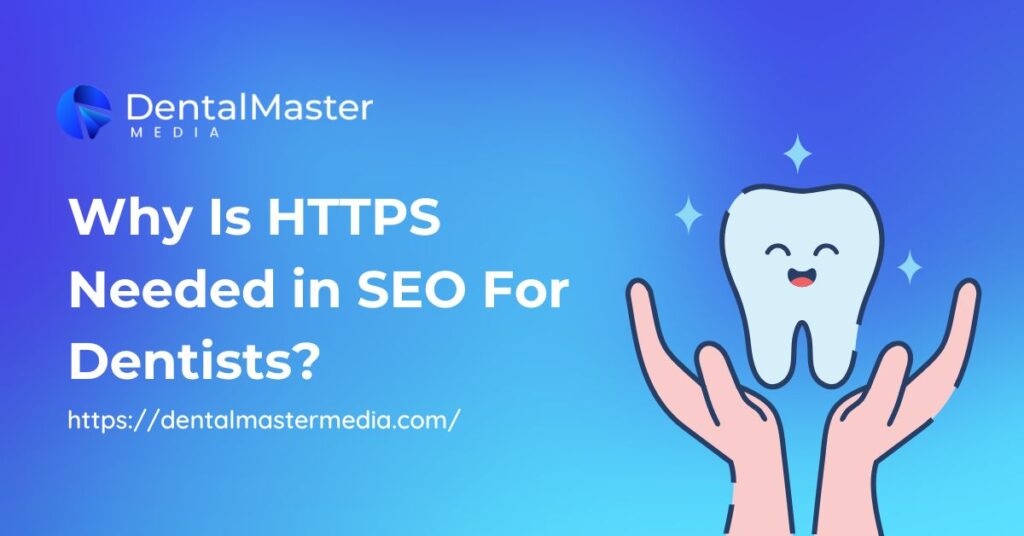A parent visits your website late in the evening, searching for help with a sudden toothache. At the top of the browser, a small lock icon shows the site is secure. The booking form loads without a warning. The message field feels safe to use.
That tiny lock does a lot of work: it protects private details, builds trust, and nudges a worried person to call or book. For a clinic site, HTTPS is the quiet helper that keeps patients moving from search result to action ,and it plays a key role in strong SEO for Dentists.
What HTTPS Means,Plain English
A quick definition you can explain to a patient
HTTPS is the secure version of the language that websites use to speak with browsers. The extra “S” stands for “secure.” It uses TLS, a system that encrypts data as it moves between the visitor and your server.
Think of it like a private tunnel. If someone types their name, phone number, or symptoms into a form, encryption scrambles that information so only your server can read it.
A trusted SEO agency for dental professionals will always recommend HTTPS because it builds both search visibility and patient confidence.
Why it matters on a dental website
A clinic site handles personal details every day: appointment requests, new patient forms, medical notes, and payment questions. Without HTTPS, that data may be exposed on public Wi-Fi or caught by bad actors.
With HTTPS, the browser and server agree on a private connection and check that the page has not been changed in transit.
Patients may not follow the technical steps, but they do notice the lock icon and the absence of scary warnings.
When people decide where to book, they look for small signs that a site is safe and cared for. HTTPS provides two of those signs: the lock icon in the address bar and the lack of warnings on forms.
Together they say, “You can trust this page.” Trust leads to calmer reading, more time spent on service details, and a higher chance that someone will send an inquiry.
That chain,from trust to time on site to action,is simple, yet it explains why security connects so closely to real-world bookings for clinics of all sizes.
Why HTTPS Affects Search
A known ranking signal and a tie-breaker
Search engines want a safer web. They have said that HTTPS is a ranking signal. It is not the only reason a page ranks, and strong content still matters most, but when two sites are close in quality, HTTPS can tip the result. In tight local results where many clinics look similar, every small edge can help your visibility.
Trust signals that lift clicks and calls
Security affects behaviour. Pages that feel safe win more clicks, longer visits, and more form submissions. If your site runs on HTTP, modern browsers may label it “Not Secure,” especially on pages with forms.
That warning makes people leave, which hurts the engagement signals search engines watch.
Switching to HTTPS removes the warning, keeps people on the page, and encourages calls and bookings.
Security Benefits That Matter to Clinics
Protecting forms, messages, and treatment enquiries
Most conversions begin with a form or a call. People share sensitive details about pain, medicines, and past treatments. HTTPS encrypts those details from the keyboard to your server.
For your staff, that means fewer lost enquiries and fewer awkward follow-ups. For patients, it means confidence that their information is handled with care.
Preventing tampering and scary browser warnings
Without HTTPS, your content can be altered between your server and the visitor. That can lead to injected ads or, in rare cases, malicious code. HTTPS includes integrity checks that stop tampering.
It also prevents mixed content warnings that appear when a secure page loads an insecure image or script. A calm, warning-free page keeps the focus on your message and next steps.
Analytics and Marketing Wins
Cleaner referral data in reports
Moving to HTTPS helps analytics record where visitors came from. When a visit jumps from a secure site to a non-secure one, referral data can be lost.
A full HTTPS setup preserves cleaner data so you can see which listings and pages drive calls.
Partnering with experts who provide Complete Dental SEO Services ensures that technical steps like this also support stronger visibility and accurate tracking.

Speed gains from modern protocols
Modern browsers use newer protocols such as HTTP/2 and HTTP/3, which usually run with TLS.
These let the browser fetch many files at once and reduce wait time. Patients feel that as quicker pages and smoother forms.
Patient-Centred Scenarios
Online booking and contact forms
Picture a first-time visitor on your booking page. With HTTPS, there is no “Not Secure” message near the address bar.
The form feels safe. The person submits their name and preferred time. Your team follows up. A small security step turns into a confirmed consult.
Clear aligner landing pages and payment plans
Many clinics promote clear aligners with quizzes and lead forms. HTTPS keeps responses private and protects the details people enter. A short note near the form,“Your information is protected”,supports the lock icon.
Emergency pages when people are in pain
Urgent pages drive quick decisions. If a person sees a warning on an emergency page, they will leave. With HTTPS, they stay and act. In stressful moments, a secure site keeps the path clear.
How to Move from HTTP to HTTPS (Step-by-Step)
Get a trusted certificate
Ask your host for a TLS certificate. Many include Let’s Encrypt at no extra cost, while paid options add extra support. Set renewals to run automatically so you never face an expired certificate.
Set 301 redirects and update internal links
Redirect every http:// URL to the matching https:// URL with a 301 rule. Do this at the server level so it is fast and reliable. Then update menus, footers, and image links so the secure version is used by default.
Fix “mixed content” and update canonicals
Mixed content happens when a secure page loads an image, script, or video over HTTP. Browsers can block those files or show warnings.
Replace old links with HTTPS versions or re-upload assets through your CMS. Check canonical tags as well; they should point to the HTTPS version to avoid duplication.
Refresh sitemaps, robots, and Search Console
Create a new XML sitemap with HTTPS URLs and submit it in Search Console. Confirm that robots.txt is reachable at the secure domain. Update ad and social destinations so visitors land on secure pages.
Update listings and social profiles
Your business profiles and major directories should list the HTTPS site. Keep details consistent across these sources. It helps visitors find the right version and avoids confusion.
Post-migration checks
Crawl the site to catch stray HTTP links. Test forms and file downloads. Watch analytics and Search Console for a few weeks while the index updates. If you want expert help, a partner like Dental Master Media can handle setup, redirects, and mixed-content fixes.
Common Mistakes to Avoid
Letting both versions stay live
If both HTTP and HTTPS load without redirects, search engines may see duplicate pages. That splits signals and can lower rankings. The clean fix is a server-level 301 to the secure version.
Partial redirects and broken images
Redirecting only the homepage is a common error. Set rules that cover every path. Then scan for broken images and script files, especially on older pages.
Forgetting staging sites
Your test site might be visible to the public. Lock it behind a password and apply HTTPS there too. You do not want patients or crawlers finding a draft version.
FAQs for Busy Practice Owners
Will HTTPS slow my site?
No. With modern hosting, HTTPS is fast, and HTTP/2 makes many pages load quicker. Good caching, image compression, and a content delivery network matter even more for speed.
Do I need it if I don’t take payments?
Yes. Most clinic sites collect personal details through forms and chats. Browsers flag any text field on HTTP as “Not Secure.” Even a basic contact page benefits from HTTPS.
Are free certificates okay?
Yes. Let’s Encrypt is widely trusted and works well for most practices. If you need advanced support or extra validation, paid options are available. The key is to keep the certificate current and the redirects correct.
Where HTTPS Fits in Your SEO Plan
How HTTPS supports SEO For Dentists goals
Treat HTTPS as a foundation. It removes warnings that cause early exits and protects the forms that bring in new patients.
Cleaner analytics show which pages drive calls. With a secure site in place, your content and profiles have a stronger base to perform.
Smart internal links to help patients act
Once HTTPS is live, help visitors take the next step. On an implants page, link to a “Who Is a Candidate?” guide and a booking page.
On a kids’ dentistry page, link to a “First Visit Guide” and an emergency care page. Clear internal links guide readers and help search engines map your site.
Conclusion
HTTPS is a small setting with a big impact. It protects the details people share, removes warnings that scare visitors away, and keeps reports clean so you can see what truly drives enquiries.
It also helps you compete in crowded results by giving both search engines and visitors a site that feels safe and easy to use.
If you want a smooth, reliable rollout with testing and follow-up checks, Dental Master Media can guide the process and keep everything current.

Suraj Rana is the owner of Dental Master Media and a leading expert in SEO for dental practices. With a passion for dental marketing, he has successfully helped numerous dental clinics climb the search engine ranks. Suraj’s expertise makes him a go-to resource for effective, results-driven dental marketing.

